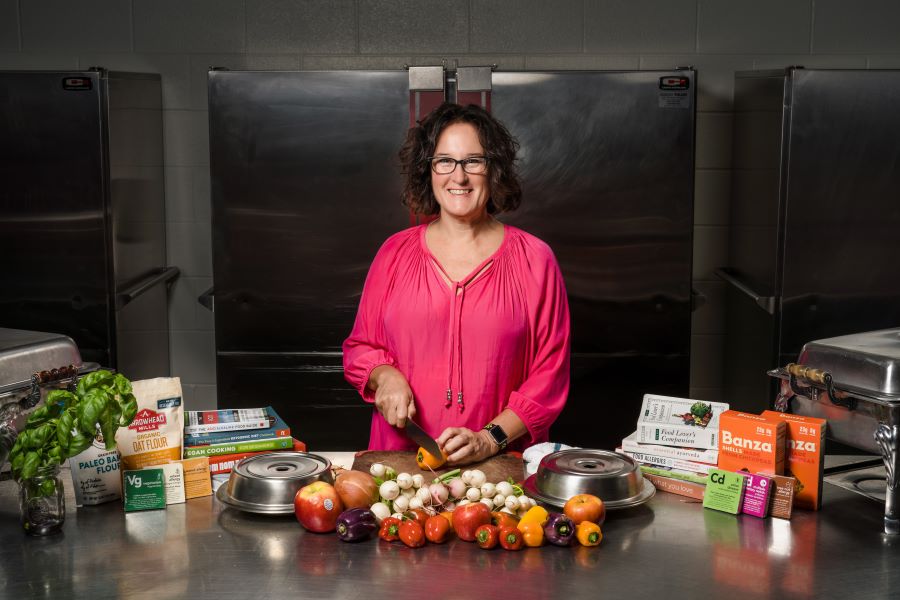Just before the pandemic hit in 2020, I interviewed 10 women doing amazing work in food and beverage for Women’s History Month. What I didn’t know at that time was that those interviews would become part of something more amazing than I could ever imagine: the Eating at a Meeting Podcast.
Since then, I have interviewed 100 more people who are in food and beverage as farmers, chefs, bartenders, caterers, advocates, hoteliers, doctors, manufacturers, event planners… and eaters. These conversations constantly remind me that the food and beverage we serve at meetings is so much more than picking items off a catering menu. They are valuable tools for social inclusion, cultural expression and relationship building.
and beverage as farmers, chefs, bartenders, caterers, advocates, hoteliers, doctors, manufacturers, event planners… and eaters. These conversations constantly remind me that the food and beverage we serve at meetings is so much more than picking items off a catering menu. They are valuable tools for social inclusion, cultural expression and relationship building.
Here are nine things I learned from my guests in 2021.
[Related: Don’t Forget These 9 F&B Priorities as We Resume In-Person Meetings]
1. Dietary Need
Managing (or eliminating) specific ingredients in the kitchen, providing for the needs in menu design, and educating servers on what they are serving and why, increases revenue, enhances experiences and creates loyal fans.
2. Equity and Inclusion
Food and beverage is not often considered when discussing DEI, despite the fact that food allergies, cultural background, religious practices, ethical beliefs and physical needs are all differences that we bring to the dining table. Being able to get to the table (in the case of attendees with disabilities) and having something safe and delicious to eat and drink is essential to providing equitable and inclusive experiences where everyone feels like they belong.
3. Beverages
The standard bar packages of soda, water, beer, wine and spirits found on catering menus must be shaken, stirred and refashioned. Drinkers and non-drinkers alike are looking for non- and low-alcoholic drinks that offer the same taste experience as a well-made cocktail or craft beer. Whether hiring a water sommelier or beverage tastemaker, adding hard ciders and flavored seltzers, or zero-proof cocktails, beverage choices can and should gratify and extend belonging.
4. Safety and Legalities
In the kitchen, at the bar, on the buffet and with service, food safety is the responsibility of everyone. It’s the law, and attendees consider it a top concern. Know the laws, but also use food safety as an opportunity to reaffirm trust, create loyal fans and grow business.
[Podcast: F&B With Tracy Stuckrath: From COVID to Food Allergies and Beyond]
5. Vegan and Plant-Based
Gone are the days of the vegan meal being the sides of the filet dinner. And, while ethical, environmental and religious needs are still reasons why attendees eat plant-based, personal health is at the forefront. Ditch crudité for irresistible beetroot carpaccio and saffron vegetable risotto. Design all menus plant-based first and then add the meat.
6. Wellness
Food and beverages are two bare necessities for everyone’s survival. They are fuel for our minds and bodies. By sourcing locally, respecting dietary needs, choosing more plant-based options, and offering more time to eat and connect, we can empower attendees for better health and mindful eating.
7. Service and Experience
Servers, event managers and banquet captains are the attendee-facing ambassadors of the culinary experience. Their knowledge of what is being served and their service skills will make or break a dining experience. And, with staffing being a challenge, we have an opportunity to help these food ambassadors shine.
8. Community and Culture
Food and beverage are essential to unite cultures and communities. They are used to welcome others, preserve and create history, demonstrate culture, express religious values, celebrate heritage, unify differences and honor and nourish community. Use your dining experiences to showcase the destination, the history and the people.
9. Sustainability
Through education and action, we need to champion sustainable and socially impactful practices by working with chefs and venues to source menu items locally, reduce food waste and recycle and/or ensure we reclaim food for donation. We can do better for all people, the planet and the bottom line.
Check out the podcast episodes related to the nine topics above at thrivemeetings.com/eating-at-a-meeting-podcast-2021.

Read Next: Why the Cuisine of the Coastal Carolinas Is Such a Treat







